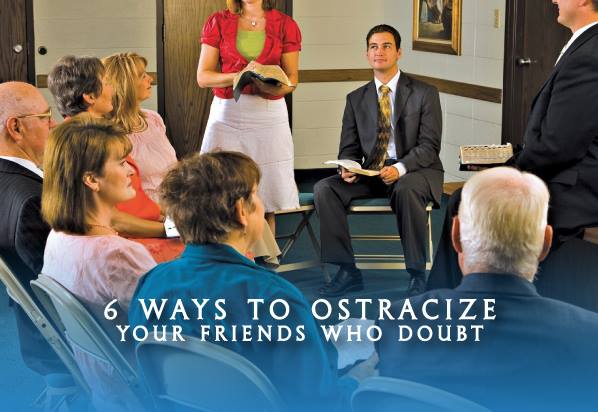Whether to a friend, a family member, or random member of your ward who has doubts, be sure to use this sure-fire list of “things to say to doubters” if you want them to feel depressed, angry, and hurt or to possibly avoid future contact with you.
“What about your covenants?”
Two reasons it will likely backfire:
- Those who took their covenants seriously in the first place are likely still seriously pondering them. This approach to sincere questioners will only feel like a guilt trip. They were “mature” enough to make the covenants and have the ability to contemplate what the covenants mean to them personally (a good practice at any point on the belief spectrum).
- Depending on what level of doubt they are experiencing, they may feel that they’ve kept their part of the bargain but are wondering whether the other side is even viable.
“Read this article, it will answer all your questions”
Why it will likely backfire:
The issue, in general, with sending articles is that they are simple Band-aids for complex spiritual wounds. An article of a few hundred words could never fully answer some question members may have on sensitive current and historical aspects of the church. Sending a surface level talk shows that you don’t understand the depth of the issues they are wrestling with.
“You just don’t understand the issues well enough”
Why it will likely backfire:
Most likely, if a person has an issue with a part of the church it is because they HAVE researched more than they ever had before. Sure, some resources are more reliable than others, but for the most part, if someone feels their personal salvation is on the line, they will carefully scrutinize those sources. There are certainly some issues for which we will probably never have the full context, but it doesn’t mean that the narrative most favorable to the church is correct by default.
I prefer to take a President Uchtdorf approach of acknowledging mistakes when he said,
“And, to be perfectly frank, there have been times when members or leaders in the Church have simply made mistakes. There may have been things said or done that were not in harmony with our values, principles, or doctrine.”
“It must not be necessary for our salvation.”
Why it will likely backfire:
Similar to the statement above, saying this disregards the fact that a particular concern is important to them. If an issue is causing them to doubt, then it IS pertinent to their salvation. If you don’t feel comfortable talking in detail about the topics of concern, express it openly. But don’t disregard their emotions by giving a blanket answer of “it’s not important to know.” This statement is not helpful to someone in current crisis but instead could compound the frustration.
“I’m going to have my friend, (insert quasi-prominent church member/ apologist/ EFY personality here), talk to you about it”
Why it will likely backfire:
I remember when my husband got a letter from (insert quasi-prominent church member/ apologist/ EFY personality here) at the request of a family member. NOT HELPFUL! It actually left me feeling frustrated too. Though well-intentioned, the leader did not really know my husband and was unaware of the details of my husband’s concerns. I feel that these personal times of faith transitions are better suited to intimate friends who know, love, and are willing to listen to you. This is no time for an appeal to authority.
Which leads me to…
“The only question that really matters is “‘Are you following the brethren?'”
Why it will likely backfire:
One of THE worst things you can say. For those with issues regarding past or present church, this is undoubtedly something they are already contemplating. “Follow the prophet” is taught as one of the core elements of the church, but for many with doubts, there is a domino effect that leads straight to leadership. Stick to the topic at hand without pulling this supposed trump card.
—
Every member knows at least one person who has struggled with one aspect or another regarding the church. For those who choose to leave, don’t automatically assume that it is due to sin or lack of spiritual intelligence. We can do better at avoiding “us vs. them” rhetoric, spending less time thinking of the right response and more time actually listening. Recognize that for those who stay, they will most likely never believe the same way again. I love how Richard Bushman describes this shift of belief in an introduction for a 2008 summer seminar on Joseph Smith.
“Other shaken individuals recover their belief in the basic principles and events but are never quite the same as before. Their knowledge, although no longer toxic, gives them a new perspective. They tend to be more philosophic and less dogmatic about all the stories they once enjoyed.”
If you find yourself using any of the above statements when talking to love ones, I would like to quote the Silver Fox again: “Stop It!”
RL

